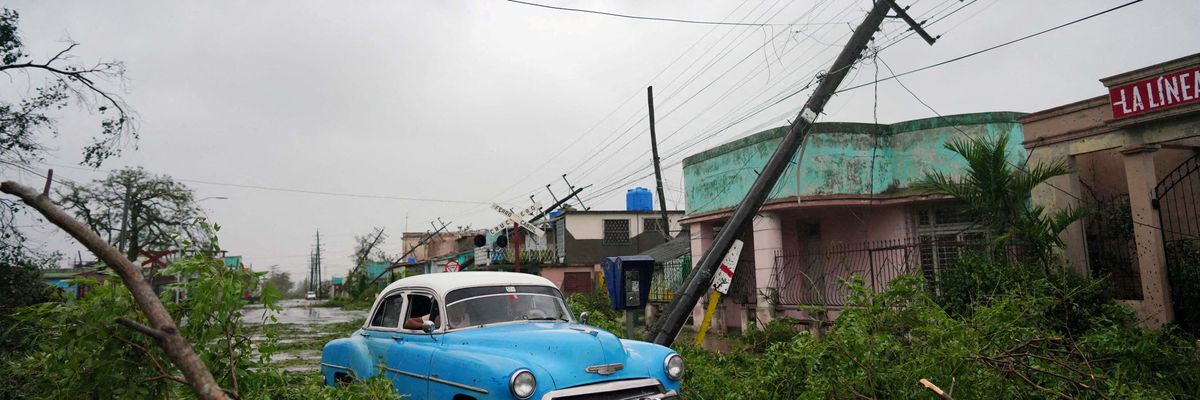Before Hurricane Ian inflicted destruction on Florida’s west coast, it ravaged the western provinces of Cuba, knocking out power to the entire island and demolishing the heart of the tobacco industry, one of Cuba’s major exporters.
On both sides of the Florida Strait, people are salvaging what they can from the rubble of their homes, crews are working to restore power, and volunteers are on scene handing out food and clothing to those who lost everything.
Natural disasters elicit humanitarian empathy by reminding us that we are all vulnerable in the face of Mother Nature’s fury. They bring out the best in people, rallying together to help one another, putting aside their myriad differences in favor of their common humanity. Hurricane Ian offers the Biden administration an opportunity to extend that humanitarian impulse to his diplomacy by offering disaster assistance to Cuba. Not only would that be a step toward improving the diplomatic atmosphere between the two countries, which has yet to recover from the toxicity of the Trump years. It would also serve the practical purpose of relieving some of the economic pressure fueling migration and could set the stage for progress on other issues of mutual interest.
Such an offer of aid would not be unprecedented. President George W. Bush, no friend of Cuba, nevertheless offered Havana help on several occasions in the wake of destructive tropical storms. In November 2001, Cuba was hit by Hurricane Michelle, a Category Four storm that did $2.8 billion in damage. Washington offered humanitarian aid channeled through non-governmental organizations. Cuban Foreign Minister Felipe Pérez Roque declined the “kindly offer,” asking instead that Cuba be able to make a one-time purchase of food to replenish its reserves destroyed by the storm. U.S. and Cuban diplomats quickly came to an agreement, and the “one-time” purchase became a continuing commercial relationship, with Cuba purchasing hundreds of millions of dollars-worth of food annually from U.S. producers.
The Bush administration again offered assistance after Hurricane Charley in 2004 and Hurricane Wilma in 2005. Havana declined because Washington insisted that the funds be channeled not through the Cuban government but through nongovernmental groups. In 2008, however, Cuba was hit by the worst hurricane season in its history: five major storms wracked the island, inflicting some $5 billion in damage, with over half a million homes damaged or destroyed. The Bush administration accelerated processing licenses for delivering private humanitarian assistance, which reached $10 million. More significantly, it offered $6.3 million of bilateral assistance, $5 million directly to the Cuban government without preconditions.
But Cuban officials could not bring themselves to accept U.S. help. In one of his “reflections” a convalescing Fidel Castro wrote, “Our country cannot accept a donation from the government that blockades us.” Instead, Havana asked that the embargo be lifted temporarily, so that Cuba could buy supplies, especially construction materials. President Bush was not willing to allow such a chink in the embargo, perhaps for fear that once general commerce with Cuba began, it would be hard to stop.
Would Cuba’s leaders be more open to accepting U.S. assistance today? There are reasons to think they would, both because the need is so dire and because Havana signaled its openness to accepting help during the recent fire at the Matanzas oil depot.
Hurricane Ian is just the latest in a series of body blows that have left the Cuban economy prostrate and Cuban people suffering the worst hardship since the decade-long depression following the collapse of the Soviet Union the 1990s. President Donald Trump’s tightening of the embargo and COVID-19’s closure of the tourist industry deprived Cuba of vital foreign exchange currency, leading to shortages of food, medicine, and fuel. The January 2021 unification of Cuba’s dual currency and exchange rates touched off triple digit inflation, eroding people’s real incomes.
This year, Cuba’s decrepit electrical grid, plagued by poor maintenance and obsolete equipment, has been operating at just 50 percent of capacity, causing rolling blackouts since April. In August, lighting started a fire at Cuba’s Matanzas oil base, the island’s largest oil storage facility and depot for receiving oil imports. The fire burned out of control for five days, consuming four of the base’s eight large storage tanks, millions of dollars’ worth of oil, and knocking the depot out of commission for the indefinite future.
When Cuba put out a request for international assistance to battle the fire, the initial U.S. response was positive. On August 6 and 8, the U.S. Embassy put out public statements offering condolences to the victims, reminding U.S. organizations that they could legally provide Cuba humanitarian aid, and offering U.S. technical assistance. Vice Foreign Minister Carlos Fernández de Cossio responded with “profound gratitude” to those who offered help, including the U.S. government.
Unfortunately, things went downhill from there. The Biden administration decided it was too politically risky to offer material assistance. The United States ended up standing on the sidelines while Mexico and Venezuela helped Cuba extinguish the fire. Recriminations followed. Havana complained that after offering help, Washington had provided nothing. The State Department insisted that Cuba had never made a formal diplomatic request for assistance. Washington missed an opportunity to be seen by Cubans as a good neighbor, and even Cuban critics of their government complained bitterly that the one country that could have helped the most did nothing while Matanzas burned.
Hurricane Ian offers Biden a second chance to improve relations by offering humanitarian disaster assistance to help repair Ian’s damage — if he has the political will to do it. His political advisers will counsel against it on the eve of the mid-term elections. Some of his policy advisers will argue against doing anything to relieve Cuba’s economic plight because it foreshadows regime change. But the humanitarian need is undeniable. President Biden often says that he “stands with the Cuba people.” Now is the time to turn those fine words into action.
















